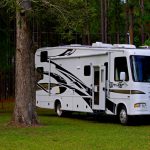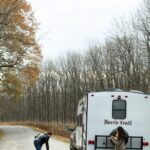Quick Answer: Living in an RV full-time can be an exciting and liberating lifestyle, but it’s important to be prepared. Here are 10 things you need to know before embarking on this adventure:
- Choosing the Right RV for Full-Time Living
- Understanding the Costs of Full-Time RV Living
- Finding the Perfect Campsite
- Preparing for Life on the Road
- Managing Your Finances
- Staying Connected on the Go
- Dealing with Maintenance and Repairs
- Embracing Minimalism and Downsizing
- Navigating the Challenges of Full-Time RV Living
- Creating a Sense of Community on the Road
Before we dive into the details, let’s take a quick look at some of the best RVs for full-time living:
- 👉 CHECK PRICE on: Class A Motorhomes | Fifth Wheels | Travel Trailers | Class B Motorhomes | Class C Motorhomes
Now, let’s explore each of these aspects in more depth to ensure you’re fully prepared for the full-time RV lifestyle!
Quick Tips and Facts
- Full-time RV living offers freedom, adventure, and the opportunity to explore new places.
- It requires careful planning, budgeting, and adaptability.
- Downsizing and embracing minimalism are essential for a comfortable life on the road.
- Staying connected to the internet and managing finances are crucial aspects of full-time RV living.
- Maintenance and repairs are inevitable, so it’s important to be prepared.
- Building a sense of community and finding like-minded travelers can enhance your experience.
Background: The Rise of Full-Time RV Living

Before we dive into the details, let’s take a quick look at the history and background of full-time RV living.
1. Choosing the Right RV for Full-Time Living
✅ Quick Tip: Consider your lifestyle and needs when choosing an RV for full-time living.
When it comes to living in an RV full-time, choosing the right RV is crucial. There are several types of RVs to consider, each with its own advantages and drawbacks. Here are some popular options:
- Class A Motorhomes: These are the largest and most luxurious RVs, offering spacious living areas and plenty of amenities. They are ideal for those who want a home-like experience on the road.
- Fifth Wheels: These RVs are towed by a pickup truck and offer a lot of living space. They are a popular choice for families or those who need extra room.
- Travel Trailers: Travel trailers come in various sizes and can be towed by a truck or SUV. They offer a good balance between comfort and mobility.
- Class B Motorhomes: Also known as camper vans, these compact RVs are easy to drive and maneuver. They are perfect for solo travelers or couples.
- Class C Motorhomes: Class C motorhomes are built on a truck chassis and offer a good combination of space and maneuverability. They are a popular choice for small families.
For a more detailed comparison of the best RVs for full-time living, check out our article on The Best RV to Live in Full-Time 2024.
2. Understanding the Costs of Full-Time RV Living
✅ Quick Tip: Budget for both fixed and variable expenses when planning for full-time RV living.
Living in an RV full-time can be more affordable than traditional homeownership, but it’s important to understand the costs involved. Here are some expenses to consider:
- RV Purchase or Rental: The cost of buying or renting an RV can vary greatly depending on the type and age of the vehicle. Consider your budget and financing options.
- Campground Fees: Campground fees can range from $10 to $100 per night, depending on the location and amenities. Monthly rates are often more cost-effective for long-term stays.
- Fuel: Fuel costs will depend on the distance you travel and the fuel efficiency of your RV. Budget for fuel expenses accordingly.
- Insurance: RV insurance is essential to protect your investment. Rates will vary depending on factors such as the type of RV, your driving record, and coverage options.
- Maintenance and Repairs: RVs require regular maintenance and occasional repairs. Budget for routine maintenance, such as oil changes and tire rotations, as well as unexpected repairs.
- Utilities: While some campgrounds include utilities in their fees, others may charge extra for electricity, water, and sewer hookups. If you plan to boondock or stay in free campsites, you may need to rely on solar power and conserve water.
- Food and Groceries: Just like in a traditional home, you’ll need to budget for groceries and dining out. Cooking meals in your RV can help save money.
- Entertainment and Activities: Budget for entertainment expenses such as park admissions, outdoor gear, and recreational activities.
By understanding and budgeting for these costs, you can ensure a smooth transition to full-time RV living.
3. Finding the Perfect Campsite
✅ Quick Tip: Research and plan your campsite options in advance to secure the best spots.
One of the joys of full-time RV living is the ability to choose your backyard. From national parks to private campgrounds, there are countless options for finding the perfect campsite. Here are some factors to consider:
- Location: Do you prefer the mountains, the beach, or somewhere in between? Consider the climate, scenery, and proximity to amenities when choosing a location.
- Amenities: Different campgrounds offer different amenities, such as swimming pools, laundry facilities, and Wi-Fi. Determine which amenities are important to you and prioritize accordingly.
- Size and Accessibility: Make sure the campsite can accommodate your RV’s size and has easy access for parking and maneuvering.
- Availability: Popular campgrounds can fill up quickly, especially during peak seasons. Make reservations in advance to secure your spot.
- Cost: Campground fees can vary greatly, so consider your budget when choosing a campsite. Some campgrounds offer discounts for long-term stays.
Researching and planning your campsite options in advance will help you find the perfect spot for your full-time RV adventure.
4. Preparing for Life on the Road
✅ Quick Tip: Create a checklist to ensure you have everything you need for life on the road.
Living in an RV full-time requires a different mindset and lifestyle compared to traditional homeownership. Here are some essential preparations to make:
- Mail Forwarding: Set up a mail forwarding service to receive your mail while on the road. This will ensure you don’t miss any important documents or packages.
- Domicile and Residency: Determine your domicile state for legal and tax purposes. Research the requirements and establish residency accordingly.
- Healthcare: Make sure you have adequate health insurance coverage that extends to your travels. Consider telemedicine options for remote medical consultations.
- Vehicle Maintenance: Regularly maintain your RV to ensure it’s in good working condition. This includes checking the engine, tires, brakes, and other essential components.
- Emergency Preparedness: Create an emergency kit with essential supplies, including first aid items, flashlights, batteries, and non-perishable food. Familiarize yourself with emergency procedures and contact information for roadside assistance.
- Weather Preparedness: Be prepared for various weather conditions by packing appropriate clothing, bedding, and equipment. Consider insulation and heating options for colder climates.
- Internet and Connectivity: Stay connected on the road by researching internet options, such as mobile hotspots or campground Wi-Fi. Consider boosting your signal with a signal booster if necessary.
By preparing for life on the road, you’ll be ready to embrace the freedom and adventure of full-time RV living.
5. Managing Your Finances
✅ Quick Tip: Use budgeting apps and tools to track your expenses and stay on top of your finances.
Managing your finances is crucial for a successful full-time RV lifestyle. Here are some tips to help you stay on track:
- Create a Budget: Determine your monthly income and expenses to create a realistic budget. Consider both fixed expenses (such as campground fees and insurance) and variable expenses (such as fuel and groceries).
- Track Your Expenses: Use budgeting apps or spreadsheets to track your expenses and identify areas where you can save money. This will help you stay accountable and make adjustments as needed.
- Save for Emergencies: Set aside a portion of your income for emergencies or unexpected expenses. Having a financial safety net will give you peace of mind on the road.
- Earn an Income on the Road: Consider remote work opportunities, freelance gigs, or starting a mobile business to supplement your income while traveling.
- Manage Debt: If you have existing debt, create a plan to pay it off or manage it effectively while living in your RV. Minimize new debt and prioritize paying off high-interest loans.
- Take Advantage of Discounts: Many campgrounds, attractions, and stores offer discounts for RVers. Research and take advantage of these discounts to save money.
By managing your finances effectively, you can enjoy the full-time RV lifestyle without financial stress.
6. Staying Connected on the Go
✅ Quick Tip: Invest in reliable internet and communication tools to stay connected while on the road.
Staying connected is essential for full-time RV living, whether it’s for work, communication, or entertainment. Here are some tips to help you stay connected on the go:
- Mobile Hotspots: Invest in a reliable mobile hotspot device and data plan to ensure internet access wherever you go. Research coverage maps and choose a provider with good coverage in the areas you plan to travel.
- Campground Wi-Fi: Many campgrounds offer Wi-Fi access, but the quality and speed can vary. Research campground reviews to determine if the Wi-Fi is reliable before making reservations.
- Signal Boosters: If you frequently find yourself in areas with weak cell signal, consider investing in a signal booster. These devices amplify weak signals and improve reception.
- Satellite Internet: If you need a more reliable and consistent internet connection, consider satellite internet options. Keep in mind that these services can be more expensive and may require additional equipment.
- Communication Apps: Use communication apps like Skype, FaceTime, or WhatsApp to stay in touch with family and friends. These apps allow you to make voice and video calls over the internet, saving on phone bills.
- Mail and Package Delivery: Use virtual mailbox services to receive mail and packages while on the road. These services provide a physical address where your mail can be forwarded or scanned and emailed to you.
By investing in reliable internet and communication tools, you can stay connected and maintain a sense of normalcy while living in your RV full-time.
7. Dealing with Maintenance and Repairs
✅ Quick Tip: Learn basic RV maintenance tasks and have a contingency plan for unexpected repairs.
Just like any other vehicle, RVs require regular maintenance and occasional repairs. Here are some tips to help you deal with maintenance and repairs on the road:
- Learn Basic Maintenance Tasks: Familiarize yourself with basic RV maintenance tasks, such as checking tire pressure, changing oil, and inspecting the roof. This will help you catch potential issues early and save on repair costs.
- Carry Essential Tools: Keep a basic toolkit in your RV for minor repairs and maintenance tasks. This should include items like screwdrivers, wrenches, pliers, and a multimeter.
- Have a Contingency Plan: Research and locate RV repair shops and service centers along your travel route. Keep a list of trusted mechanics and their contact information for emergencies.
- Join RV Communities: Join online RV communities and forums to connect with experienced RVers who can offer advice and recommendations for repairs and maintenance.
- Consider Extended Warranty: If you’re purchasing a new RV, consider investing in an extended warranty to cover major repairs and unexpected expenses. Read the terms and conditions carefully to understand what is covered.
By being proactive and prepared, you can minimize the impact of maintenance and repairs on your full-time RV lifestyle.
8. Embracing Minimalism and Downsizing
✅ Quick Tip: Take the time to declutter and downsize your belongings before moving into your RV.
Living in an RV full-time requires embracing minimalism and downsizing your belongings. Here are some tips to help you declutter and downsize effectively:
- Assess Your Belongings: Take an inventory of your belongings and determine what is essential and what can be let go. Consider the size and storage limitations of your RV when making decisions.
- Sell, Donate, or Store: Sell or donate items that you no longer need or use. Consider renting a storage unit for sentimental items or seasonal belongings that you may not need on a daily basis.
- Maximize Storage Space: Invest in storage solutions that maximize the available space in your RV. Use collapsible containers, hanging organizers, and under-bed storage bins to make the most of every inch.
- Multi-Purpose Items: Choose multi-purpose items that serve multiple functions. For example, opt for a sofa bed that can double as a guest bed or a dining table that can be folded away when not in use.
- Digitalize Documents and Photos: Scan important documents and photos and store them digitally to save space. Use cloud storage or external hard drives to keep your digital files organized and accessible.
By embracing minimalism and downsizing your belongings, you’ll create a more comfortable and clutter-free living space in your RV.
9. Navigating the Challenges of Full-Time RV Living
✅ Quick Tip: Embrace flexibility and adaptability to navigate the challenges of full-time RV living.
While full-time RV living offers many benefits, it also comes with its fair share of challenges. Here are some common challenges and tips for navigating them:
- Weather Conditions: Be prepared for various weather conditions, including extreme heat, cold, and storms. Pack appropriate clothing, bedding, and equipment to stay comfortable.
- Limited Space: Adjusting to a smaller living space can be challenging. Maximize storage options and keep your living area organized to make the most of the available space.
- Loneliness and Isolation: Full-time RV living can sometimes be isolating, especially if you’re traveling alone. Join RV communities, attend meetups, and connect with other RVers to build a sense of community.
- Healthcare and Medical Services: Research healthcare options and medical facilities in the areas you plan to travel. Consider telemedicine services for remote medical consultations.
- Navigating New Locations: Getting used to new locations and finding your way around can be challenging. Use map and traffic apps to plan your routes and be prepared for various stops along the way.
- Handling Unexpected Situations: Full-time RV living requires adaptability and problem-solving skills. Be prepared for unexpected situations and have contingency plans in place.
By embracing flexibility and adaptability, you’ll be better equipped to navigate the challenges that come with full-time RV living.
10. Creating a Sense of Community on the Road
✅ Quick Tip: Attend RV meetups, join online communities, and connect with other RVers to create a sense of community.
Living in an RV full-time doesn’t mean you have to give up a sense of community. Here are some tips for creating a sense of community on the road:
- Attend RV Meetups and Gatherings: Join RV meetups and gatherings in your area to connect with other RVers. These events often include social activities, workshops, and opportunities to share experiences.
- Join Online RV Communities: Join online RV communities and forums to connect with other RVers. These platforms offer a wealth of knowledge, advice, and support from experienced RVers.
- Volunteer and Give Back: Consider volunteering at national parks, wildlife refuges, or other organizations that align with your interests. This is a great way to meet like-minded individuals and give back to the community.
- Stay at RV Parks and Campgrounds: Choose RV parks and campgrounds that foster a sense of community. Look for amenities such as communal gathering areas, group activities, and social events.
- Connect with Local Communities: Explore the local communities you visit and engage with the locals. Attend local events, visit farmers’ markets, and support small businesses to connect with the local culture.
By actively seeking out opportunities to connect with others, you can create a sense of community and make lifelong friendships on the road.
FAQ

Is living in an RV full-time worth it?
Living in an RV full-time can be a rewarding and fulfilling lifestyle for those who enjoy travel, adventure, and a minimalist lifestyle. It offers the freedom to explore new places, connect with nature, and build a sense of community on the road. However, it’s important to consider the challenges and lifestyle adjustments that come with full-time RV living before making the decision.
Read more about “Is RV LIFE Trip Wizard Worth It? …”
What is the downside of living in an RV full-time?
While full-time RV living offers many benefits, it also comes with its fair share of challenges. Some downsides include limited living space, the need for regular maintenance and repairs, adapting to new locations, and potential feelings of loneliness or isolation. It’s important to be prepared for these challenges and have a flexible mindset to fully enjoy the full-time RV lifestyle.
Read more about “The Best RV to Live in Full-Time … 🚐✅”
How do I prepare to live in an RV full-time?
To prepare for full-time RV living, start by choosing the right RV for your needs and budget. Create a budget that includes all the costs associated with full-time RV living, such as campground fees, fuel, insurance, and maintenance. Downsize your belongings and embrace minimalism to make the most of the limited space in your RV. Research and plan your campsite options in advance to secure the best spots. Finally, be prepared for the challenges that come with full-time RV living and have contingency plans in place.
Read more about “What Percentage of RVers are Full-Time? …”
Is it possible to live full-time in an RV?
Yes, it is possible to live full-time in an RV. Many people choose to embrace the full-time RV lifestyle for its freedom, adventure, and sense of community. With careful planning, budgeting, and adaptability, living in an RV full-time can be a fulfilling and rewarding experience.
Read more about “What RV Brand Lasts the Longest? … 🚐”
Conclusion

Living in an RV full-time can be an exciting and liberating lifestyle, offering the freedom to explore new places, connect with nature, and build a sense of community on the road. However, it’s important to be prepared for the challenges and lifestyle adjustments that come with full-time RV living.
By choosing the right RV, understanding the costs involved, finding the perfect campsite, and preparing for life on the road, you’ll be well-equipped to embark on this adventure. Managing your finances, staying connected on the go, and dealing with maintenance and repairs are essential aspects of full-time RV living.
Embracing minimalism and downsizing your belongings, navigating the challenges, and creating a sense of community on the road will enhance your full-time RV experience.
Remember, the full-time RV lifestyle is not for everyone, but for those who embrace it, it can be a life-changing and fulfilling adventure. So, are you ready to hit the road and start your full-time RV journey?
Recommended Links
- 👉 CHECK PRICE on: Class A Motorhomes | Fifth Wheels | Travel Trailers | Class B Motorhomes | Class C Motorhomes
- The Best RV to Live in Full-Time 2024
- Full-Time RVing
- Luxury RVs




